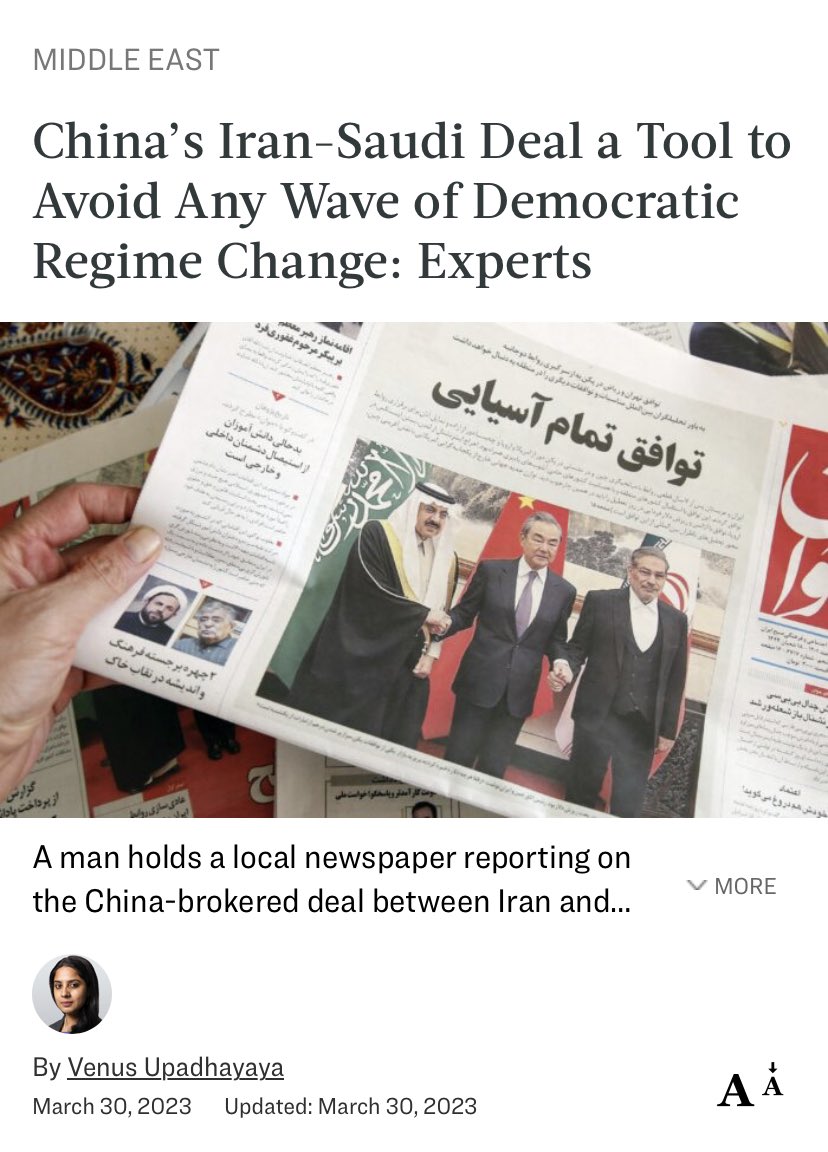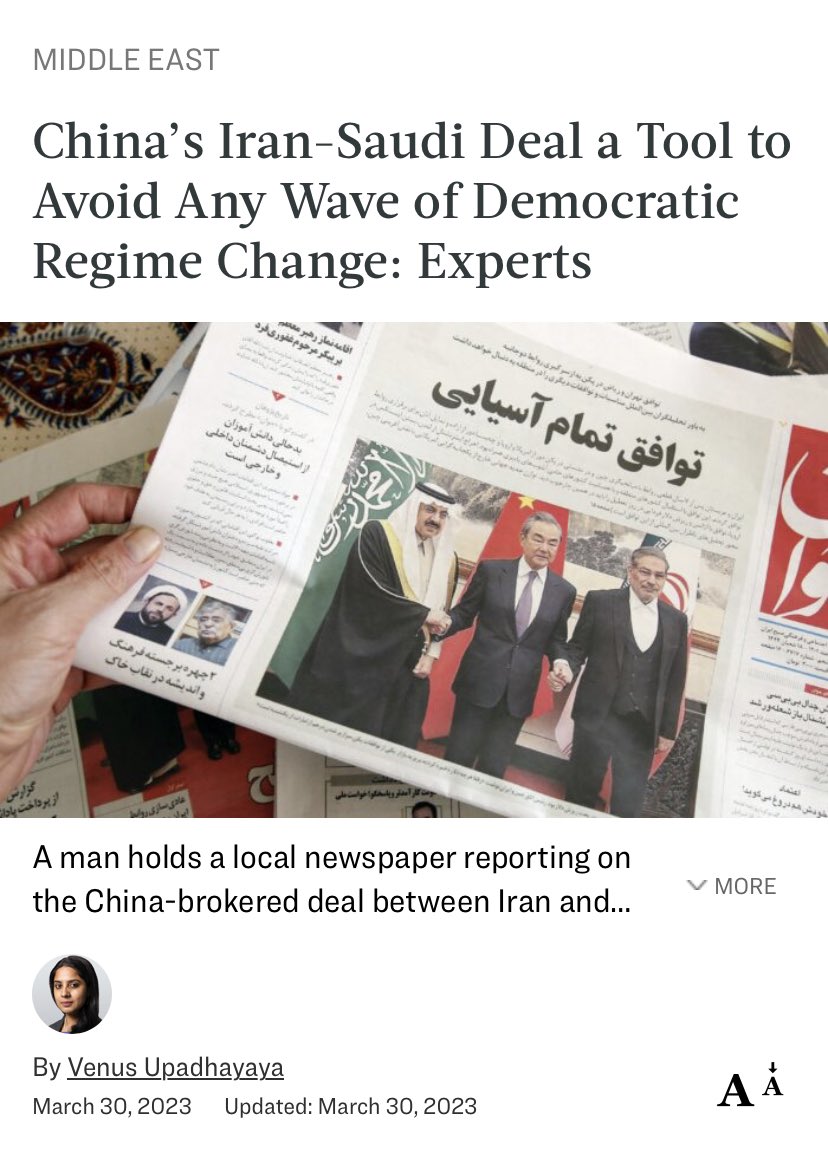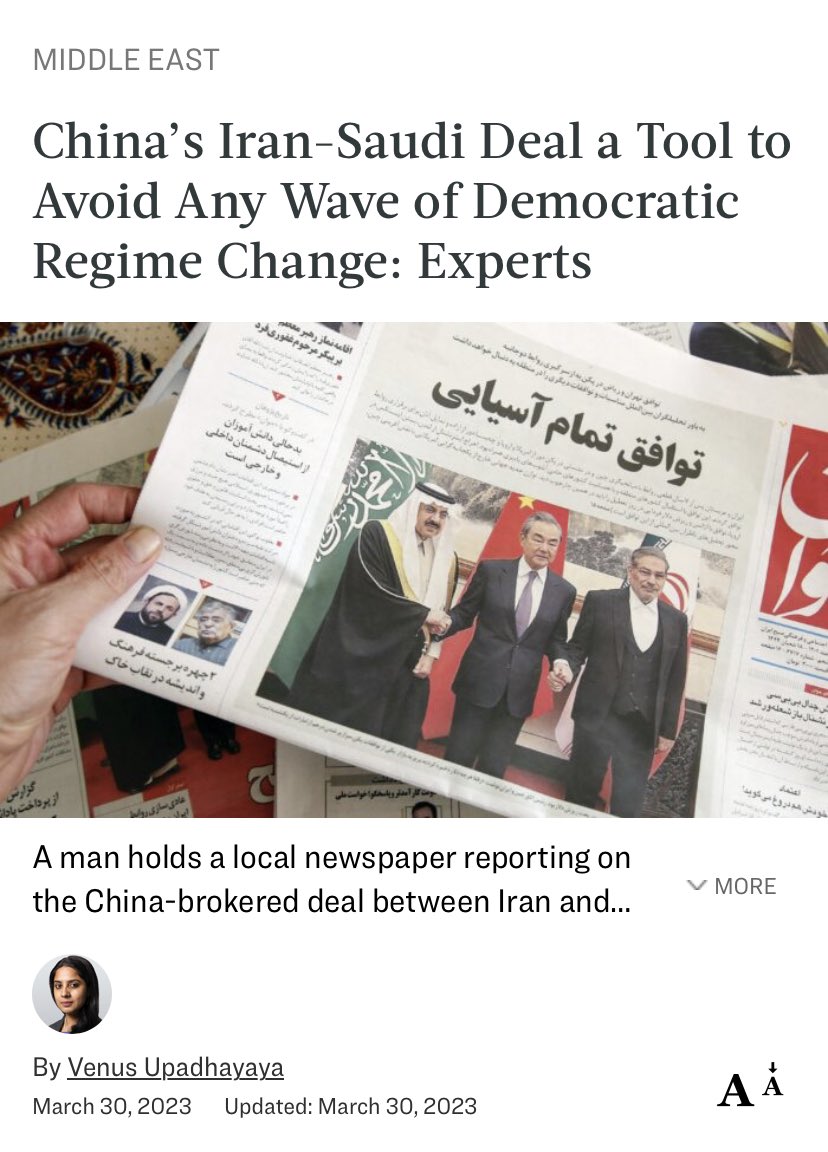#China’s #Iran-#Saudi Deal a Tool to Avoid Any Wave of Democratic Regime Change:
I was quoted
@EpochTimes @venusupadhayaya
Thread
I highlighted: Saudi MBS Vision 2030, requires
“De-escalation with Turkey, Qatar, Syria, resumption of relations
theepochtimes.com/chinas-iran-sa…
⬇️1
I was quoted
@EpochTimes @venusupadhayaya
Thread
I highlighted: Saudi MBS Vision 2030, requires
“De-escalation with Turkey, Qatar, Syria, resumption of relations
theepochtimes.com/chinas-iran-sa…
⬇️1
with #Iran and de-facto relations with Israel are all linked to his 2030 vision,”. Bahrami said that although these deals are being defined between China and Iran, they are still waiting for US to revive #JCPOA.
“As long as international sanctions and banking sanctions
2⬇️
“As long as international sanctions and banking sanctions
2⬇️

against Iran exist, such deals with China remain on paper. #Iran was also blacklisted by the #FATF. China is not in a position to take the risk of U.S. sanctions for dealing with Iran,” Bahrami said. Regarding China-Iran military deal, Bahrami said: China is seeking to
3⬇️
3⬇️

create a balance between Iran and the Arab States, and also to strengthen Khamenei’s “look to the east” doctrine. “situation is gray. #Saudi-#Iran deal details are ambiguous. Geopolitical implications depend on whether regimes’ moves are strategic or tactical,” said Bahrami.
4⬇️
4⬇️

If Iran’s move is strategic, Bahrami said it needs to end its financial and military support to the #Houthi rebels in #Yemen, and to force them to join peace talks.
“If Iran avoids such a policy, I recognize the Iranian move as tactical,” Bahrami said, adding that the first
5⬇️
“If Iran avoids such a policy, I recognize the Iranian move as tactical,” Bahrami said, adding that the first
5⬇️

minimum implication of deal will be the likely cooling of tensions between #Saudi_Arabia and #Iran over Yemen, Iraq, Lebanon, and the Persian Gulf. Therefore, the least the deal can indicate is that Iran and Saudi are moving from “offensive realism toward defensive realism,”
6⬇️
6⬇️

“If Saudi Arabia and Iran move from offensive realism to defensive realism, this deal is highly likely to help stabilize current order in the Middle East, but adds a new international actor—China,” Bahrami said.
For the deal to sustain, Tehran and Riyadh need to sacrifice
7⬇️
For the deal to sustain, Tehran and Riyadh need to sacrifice
7⬇️

“#Iran will stop developing its missile arsenal and freeze nuclear ambitions. In return, Iran expects #Saudi_Arabia to stop media war against theocracy, stop accumulating western weapons, and to encourage Arab states and Western allies to end Iran’s isolation,” said Bahrami.
8⬇️
8⬇️

Bahrami said there is one thing that neither Tehran nor Riyadh would want to occur. “Iran must not become a democracy. This is because MBS knows the next one will be #Saudi_Arabia ,” he said.
“Thus, considering the #Iranian regime’s vulnerability inside the country,
9⬇️
“Thus, considering the #Iranian regime’s vulnerability inside the country,
9⬇️

Saudi Arabia prefers to deal with such a regime in order to: One, impose what it wants; and two, avoid a wave of regime change in authoritarian countries across the Middle East.” Amplified domestic problems have pushed the Iranian regime to
10⬇️
10⬇️

decrease tensions with its neighbors, Bahrami said, and if the #Iran regime doesn’t undertake domestic reforms and doesn’t choose “defensive realism,” the resumption of relations with #Saudi_Arabia will turn out to be a mere tactical move, and won’t last long.
11 END
11 END

@threadreaderapp unroll please
• • •
Missing some Tweet in this thread? You can try to
force a refresh

 Read on Twitter
Read on Twitter



